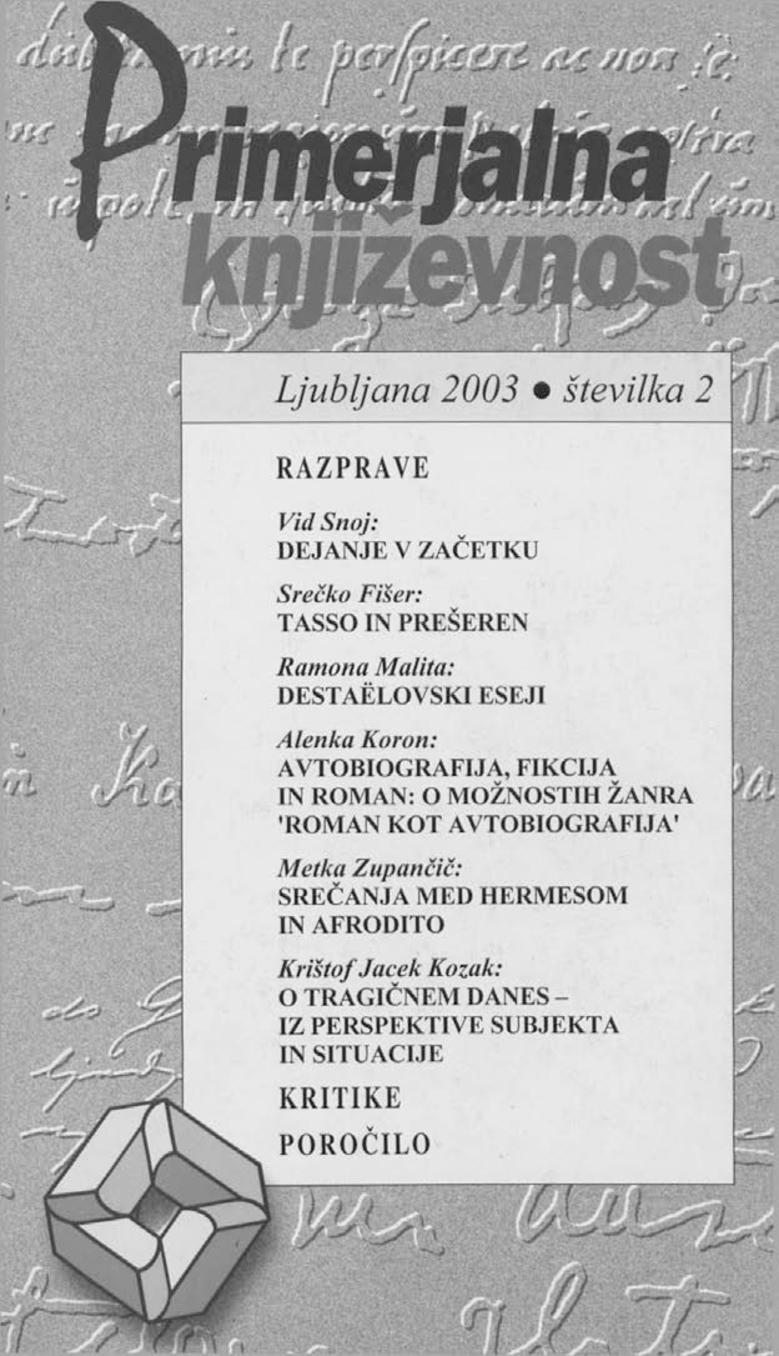O tragičnem danes – iz perspektive subjekta in situacije
Ključne besede:
tragedija, teorija tragedije, Aristotel, Lévinas, Emmanuel, postrukturalizem, subjektPovzetek
Članek zasleduje vpliv, ki so ga imele Aristotelove predpostavke o tragediji, in tako poudarja vprašanje paradigmatizacije Poetike. V zvezi s sodobnimi oblikami tragedije se članek nadalje posveča institucionalizaciji subjektovega razkroja in poststrukturalističnim hipotezam ter novim temeljem za samo-vzpostavitev subjekta, kakor jih je razvil filozof Lévinas. Članek zagovarja sodobni pogled na tragedijo, ki jo razume kot dramatično, konfliktno situacijo, ki pa mora izpolnjevati dva pogoja: biti mora hkrati neizogibna in nerazrešljiva.Literatura
ADORNO, Theodor W. Ästhetische Theorie. Ur. Gretel Adomo, Rolf Tiedemann. Frankfurt ob Majni: Suhrkamp, 1973.
BRUNETIÈRE, Ferdinand. The Law of the Drama. Prev. Philip M. Hayden. New York: Dramatic Museum of Columbia University, 1914.
CRITCHLEY, Simon. »Prolegomena to Any Post–Deconstructive Subjectivity.« Deconstructive Subjectivities. Ur. Simon Critchley, Peter Dews. New York: SUNY Press, 1996. 13–45.
CRITCHLEY, Simon, Peter Dews. »Introduction.« Deconstructive Subjectivities. Ur. Simon Critchley, Peter Dews. New York: SUNY Press, 1996. 1–12.
DIDEROT, Denis, Jean Le Rond d’Alembert. Encyclopédie, ou Dictionnaire Raisonné des Sciences, des Arts et des Métiers par une Société des Gens de Lettres Mis en Ordre & Publié par Diderot & Quant à la Partie Mathématique, par D’Alembert. New York: Readex Microprint Corp., 1969.
DRAKAKIS, John, Naomi Conn Liebler, ur. Tragedy. London: Longman, 1998.
FERRY, Luc, Alain Renaut. Philosophy of the Sixties: An Essay on Antihumanism. 1985. Prev. Mary H. S. Cattani. Amherst: University of Massachussets Press, 1990.
FICHTE, Johann Gottlieb. »Über den Begriff der Wissenschaftslehre oder der sogenannten Philosophie.« Fichtes Werke. Johann Gottlieb Fichte. Zv. 1. Berlin: De Gruyter, 1971.
FLANNERY, James. »In Search of a Poetic Drama for the Post-Modernist Age.« The Modernists. Studies in a Literary Phenomenon. Ur. Lawrence B. Gamache, lan S. MacNiven. London: Associated University Press, 1987. 75–91.
FUCHS, Elinor. The Death of Character: Perspectives on Theater After Modernism. Bloomington; Indianapolis: Indiana University Press, 1996.
GEUSS, Raymond. »Introduction.« The Birth of Tragedy. Friedrich Nietzsche. Cambridge: Cambridge University Press, 1999. vii–xxx.
GRUMACH, E., ur. Unterhaltungen mit Goethe. Weimar, 1956.
HEGEL, Georg Wilhelm Friedrich. Ästhetik. 1835. Frankfurt ob Majni: Europäische Verlagsanstalt, 1955.
KOS, Janko. »K vprašanju o bistvu tragedije.« Primerjalna književnost 19.1 (1996): 1–16.
KRALJ, Vladimir. Dramaturški vademekum. 1964. Ljubljana: Mladinska knjiga, 1984.
LANGER, Susanne K. Feeling and Form: A Theory of Art Developed from »Philosophy in a New Key«. 1953. London: Routledge & Kegan Paul, 1959.
LÉVINAS, Emmanuel. Collected Philosophical Papers. Prev. Alphonso Lingis. Haag: Martinus Nijhoff, 1987.
---. Totalité et lnfini: Essai sur l’Extériorité. Haag: Martinus Nijhoff, 1965.
---. »Wholly Otherwise.« Re-Reading Lévinas. Ur. Robert Bemasconi, Simon Critchley. Bloomington; Indianapolis: Indiana University Press, 1991. 3–10.
LUKÁCS, Georg. Entwicklungsgeschichte des Modernen Dramas. Ur. Frank Benseler. Darmstadt: Luchterhand, 1981.
---. »The Metaphysics of Tragedy.« Soul and Form. Georg Lukács. London: Merlin Press, 1974. 152–74.
MILLER, Arthur. »Tragedy and the Common Man.« The Theater Essays of Arthur Miller. Arthur Miller. New York: Viking Press, 1978. 3–7.
NORRIS, Christopher. What's Wrong with Postmodernism: Critical Theory and the Ends of Philosophy. Baltimore: The Johns Hopkins University Press, 1990.
PAVIS, Patrice. Theatre at the Crossroads of Culture. London: Routledge, 1992.
PLUMPE, Gerhard. Ästhetische Kommunikation der Moderne. Opladen: Westdeutscher Verlag, 1993.
ROCHE, Mark William. Tragedy and Comedy: A Systematic Study and a Critique of Hegel. Albany: SUNY Press, 1998.
ROSENSTEIN, Leon. »Tragic Thoughts and the Entertainment of Possibility.« Tragedy and Philosophy. Ur. N. Georgopoulos. New York: St. Martin’s Press, 1993. 57–69.
SARTRE, Jean-Paul. »L’Universel Singulier.« Kierkegaard Vivant. Pariz: Gallimard, 1966. 20–63.
SIMONS, H. W., M. Billig. After Postmodernism. Reconstructing Ideology Critique. London: Sage, 1994.
SOURIAU, Etienne. Les deux cent mille situations dramatiques. Pariz: Flammarion, 1950.
SZONDl, Peter. Versuch über das Tragische. 1961. Frankfurt ob Majni: Insel, 1964.
TAYLOR, Charles. The Sources of Self. The Making of the Modern Identity. Cambridge: Harvard University Press, 1989.
UNAMUNO, Miguel de. Tragic Sense of Life. Prev. J. E. Crawford Flitch. New York: Dover Publications, 1954.
VREČKO, Janez. Ep in tragedija. Maribor: Obzorja, 1994.
---. Atiška tragedija. Maribor: Obzorja, 1997.
WILLIAMS, Raymond. Modern Tragedy. London: Chatto; Windus, 1966.
ZIMA, Peter V. Theorie des Subjekts: Subjektivität und Identität zwischen Moderne und Postmoderne. Tübingen: Francke, 2000.


